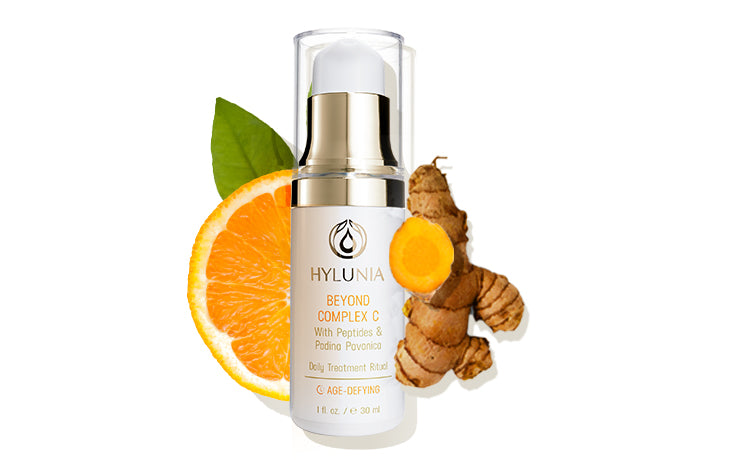Article: Anti-Ageing
Anti-Ageing
Defy Your Age.
Who says you have to look your age? Skin aging may be a natural part of growing older, but you don't have to give in to it. You can manage it. Smoother, younger looking skin is possible.
As you mature, skin gets thinner, less elastic and can change color due to sun damage, hormonal changes, and genetics. Know the causes, and you can minimize the appearance of fine lines, wrinkles and age spots.
Hylunia's skin therapists created this resource center to help you better understand skin aging:
- eye wrinkles
- facial wrinkles
- aging around the eyes (dark circles under eyes, puffiness)
- sun damage and skin discoloration (age spots, liver spots, hyperpigmentation)
- forehead wrinkles
- hormonal aging
- genetic aging
- environmental aging
What is Skin aging?
Skin aging is genetically programmed into our skin. It is caused by changes in collagen and elastin, which gives skin its firmness and elasticity. The loss of collagen and elastin also causes moisture loss, which leads to dry skin.
The appearance of facial wrinkles start in the second layer of the skin, known as the dermis. The dermis is home base to collagen, elastic tissue and reticular fiber (connective tissue), which are necessary for the appearance of skin thickness.
As skin ages, it thins, meaning that there's less structural integrity. Collagen is reduced, elasticity is decreased and connective tissue is compromised.
Signs of Skin Aging
The signs of skin aging can become visible when someone is in their 20s. Typical signs of aging skin are:
- fine lines and wrinkles
- age spots and other skin discoloration (also known as hyperpigmentation)
- dryness
- sagging or rumpled skin
- dull complexion
- thinner skin
- oily skin
- facial hair
What Causes Fine Lines and Wrinkles?
Fine lines, wrinkles and other signs of skin aging are caused by:
- Hormonal aging
- Genetic aging
- Environmental aging
Hormonal Aging
As we age, hormone levels change. Hormones help regulate every body process, and the skin is no different.
Female hormones, estrogen in particular, significantly influence skin aging. The decrease in estrogen effects collagen production, skin elasticity, circulation to the skin linked to skin redness, thinner skin, and skin strength. Genetic aging and environmental aging factors further influence these changes.
Hormonal aging can’t be stopped, but it can be managed.
Genetic Aging
Biological age and chronological age aren’t the same things. Your chronological age is how many years old you are. Your biological age determines how the body ages. Molecular biologists are only just learning how genetics influence biological aging, including traditional signs of skin aging.
Biological aging is tied to your genes. You inherited a timer for how long and how strong your body is. This is why some people show signs of skin aging in their 20s, while others hardly show any signs in their 40s.
Like hormonal aging, genetic aging can’t be stopped, but it can be managed.
Environmental Aging
Environmental aging is the only preventable aging factor. The three recognized causes of environmental aging are:
- Exposure to UV rays
- Exposure to smog, pollution and toxins
- Poor diet
While most people know that prolonged or excessive exposure to UV rays can cause premature aging, there are other factors that lead to environmental aging.
Exposure to smog, pollution and toxins can change cellular structure throughout the body. It shows in the skin in the form of premature aging.
A poor diet—one with too many bad foods or not enough good foods or low in essential nutrients or vitamins—contributes to cell degeneration, which can cause premature aging. Other types of poor diets, including crash dieting, eating too much sugar, eating too many processed foods, also contribute to premature aging.
Types of Skin Aging
There are different types of aging skin:
|
Type |
Description |
|
Hormonal aging |
For most people, hormonal aging becomes most visible in their 30s in the form of fine lines, wrinkles, sagging skin, age spots (hyperpigmentation) and dull-looking skin. |
|
Genetic aging |
Genetics determine everything from your hair color and height, your skin tone and texture to your shoe size—it even dictates when your skin will start showing the signs of aging. |
|
Environmental aging |
Environmental influences such as exposure to pollution, sun exposure and environmental toxins such as those found in household cleaning products and personal care products can lead to premature aging. |
|
Crow’s feet (eye wrinkles) |
These are the lines that appear at the outer edges of the eye. They are created from smiling, squinting, laughing and blinking. Sleeping on your side or stomach can also cause them. |
|
Laugh lines (mouth wrinkles) |
These appear at the outer creases of the mouth and around the lip line. They are created from laughing, smoking, drinking from a straw, and pursing lips due to stress. |
|
Forehead Wrinkles |
Muscle movement and facial expression cause forehead wrinkles. They are horizontal and vertical lines that crisscross the area between your eyes and hairline. |
|
Fine lines |
These are the first sign of skin aging. |
|
Wrinkles |
Wrinkles are deeper than fine lines and require more intensive treatment to minimize their appearance. |
|
Sagging skin |
This indicates an extreme loss of skin elasticity and may require surgical intervention to correct. Female hormones play a big role in fatty tissue deposits, which are what help skin appear younger and more refreshed. As female hormones decrease, the fatty tissues decrease as well, giving skin less structure. The result is sagging skin, which appears to be less elastic and creates fine lines, deep wrinkles or skin folds. |
|
Thinning skin |
Hormonal aging thins the skin by decreasing blood flow. The decreased blood flow means a reduction in cellular turnover and increase in water loss, which can make the skin appear dryer as well. The thinning of the skin also means that its barrier function is compromised, which can make skin more prone to injury. |
|
Facial hair |
Decreases in female hormones mean that testosterone is more active in your system. This can lead to an increase in facial hair growth. |
|
Dull complexion |
This is caused by a decrease in cellular turnover. Dead cells say on the skin surface longer, casting a dull or sallow appearance. |
|
Oily skin |
Changes in hormone levels can lead to increased oil production. The extra oil can lead to breakouts or blemishes, so you may need to change your skin care routine. |
|
Age spots or other hyperpigmentation |
Female hormones regulate melanin production. Melanin is what dictates skin color or tone. When melanin is properly regulated your skin appears to have an even skin tone. When the body produces extra melanin, it can darken the skin in the form of age spots, liver spots or other skin discoloration. |
|
Dry skin |
As collagen and elastin decrease, it’s harder for skin to retain its natural moisture. |
Managing Skin Aging, Fine Lines and Wrinkles
While aging can’t be stopped, it can be managed.
Skin Care Regimen
- Use skin care products formulated with vitamins, antioxidants and peptides.
- Seek out products with Kojic Acid, a mushroom extract known to help brighten skin tone.
- Wash your face with warm, not hot, water. Hot water can remove too much of your skin's natural oil, leaving skin feeling and looking dry and older than it really is.
- Exfoliate weekly to remove dead skin cells and brighten your complexion with products formulated with alpha-hydroxy acids (AHA) and beta-hydroxy acids (BHA).
- Rehydrate immediately after exfoliating to replenish moisture and oils lost during the sloughing process.
- Get microdermabrasion treatments from a licensed skin therapist or esthetician.
- Get laser treatments from a doctor or dermatologist.
Diet
- Eat a diet rich in essential fatty acids. Salmon, walnuts, eggs, flax and certain oils can help support your body's changes.
- Consider taking an Omega 3-6-9 dietary supplement to ensure your body gets the essential fatty acids it needs to optimize the changes in hormone levels.
- Drink more water! Replenish the moisture lost through the aging process by drinking more water every day. Have a glass when you wake up, before you eat every meal and before you go to bed. Then find a way to drink at least three more glasses of water throughout the day.
Lifestyle
- Use sunscreen more than ever before. Make sure you apply a sunscreen of 15 SPF or higher as often as needed.
- Wear sunglasses and a wide-brimmed hat every time you go outside
- Cover your arms and legs to prevent excessive sun exposure.
- A side effect of hormonal aging is a decrease in the production of melanocytes, which produce melanin. Skin appears lighter because fewer melanocytes are produced, which increases your risk to sun exposure and resulting sun damage. You may experience sunburn more often, which can lead to increased skin aging. Use a sunscreen every time you’re outside.
- Use household cleaning products that are free of known toxins and irritating chemicals. Skin absorbs what it comes in contact with, so while you may not apply window cleaner to your skin, your skin absorbs it when you open a medicine cabinet to retrieve your cleanser, toner and moisturizer.
- Manage stress. The stress brought on by every day living contributes to the aging process.
Hylunia Age Defying Ritual
|
Step |
Purpose |
Hylunia Product |
|
Step 1 |
Cleanse |
|
|
Step 2 |
Tone |
|
|
Step 3 |
Moisturize |
|
|
Daily Treatment |
Special Care |
|
|
Weekly Ritual |
Exfoliate |
|
|
Weekly Ritual |
Infusing Mask |
|
|
Booster |
Dark Circles Under Eyes |
|
|
Kit |
System Starter |
|
|
Kit |
Travel Kit |
Age Defying Ingredients
Hydroxyproline
Centipeda Cunninghamii Extract
Apricot Kernel
Evening Primrose
Kojic Acid



